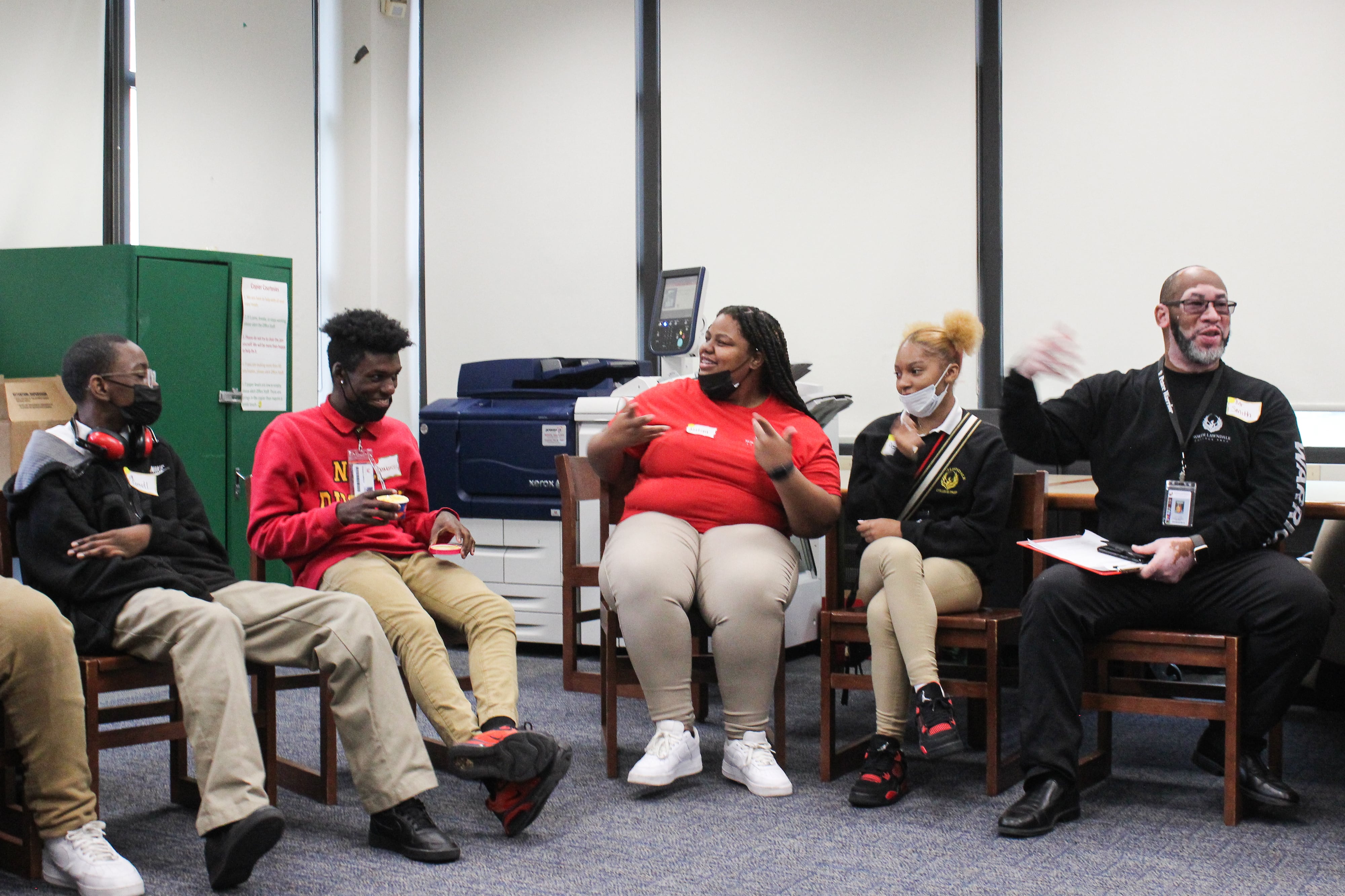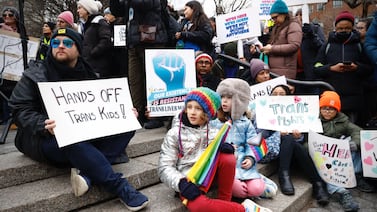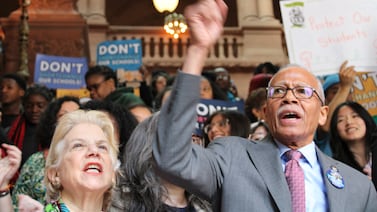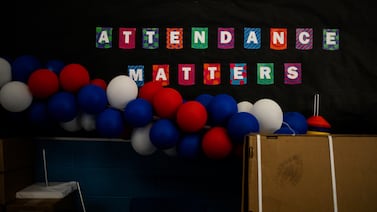Eighteen Chicago charter schools and networks got the school board’s blessing to continue operating beyond this school year — but in many cases for relatively short stretches.
The process reflects an ongoing shift in the district’s relationship with its charters. Until this year, the overwhelming majority of these schools had reliably gotten five-year renewals, in some cases for more than two decades. But at the school board’s Wednesday meeting, most got much shorter contracts. Almost half landed only two-year extensions and only two schools got the full five years.
In recent years, the district has put opening new charter schools on hold amid steeply declining enrollment and has resorted to shorter-term charter renewals with strings attached. Some charter operators have argued that the shorter extensions create uncertainty for their school communities, some of which serve largely low-income and other vulnerable students.
At the Wednesday meeting, more than a dozen charter administrators, parents, and students pleaded for longer extensions. Christian Feaman of the Illinois Network of Charter Schools decried the short-term renewals as disruptive and said the advocacy group is pushing for 10-year terms for high-performing charters.
“We continue to be concerned about the lack of consistency and transparency in the renewal process that moves the bar,” he said, adding, “Renewal terms of less than five years jeopardize the stability of our schools.”
But district officials said the shorter-term renewals reflect a push to hold charters more accountable. The district has closely scrutinized how charters serve students with disabilities and English language learners, and how they ensure these schools’ discipline practices do not harm students.
The renewals approved at the board’s monthly meeting on Wednesday largely came with conditions — a list of student outcomes and other requirements that schools have to meet during that renewal period. Those conditions were not included in public board meeting documents but instead will be communicated to charter operators directly.
Charter leaders and supporters ask for longer renewals
One school, Instituto Justice and Leadership Academy, a small alternative high school on the city’s Southwest Side, had its charter renewed for one year only.
Many on the renewal list were approved to continue operating for another two years. Those schools are: North Lawndale Charter Prep, Alain Locke Charter School, Little Black Pearl, Plato Learning Academy, Passages, Horizon Science Academy Southwest, and Instituto Health Sciences Career Academy. Acero Schools, Chicago Collegiate Charter School, Intrinsic, Christopher House, and University of Chicago Charter School landed three-year renewals.
Two alternative campuses run by Camelot Schools — Chicago Excel Academy and Camelot’s SAFE Achieve Academy, for students who have been expelled — along with Hope Learning Academy got renewed for four years. The Excel Academy of Englewood and Chicago Tech Academy High School got five-year renewals.
It was the first time Acero, Alain Locke, and the University of Chicago Charter Schools did not get five-year renewals since they were launched in 1998.
Employees and supporters of the charters up for renewal turned out en masse at the Wednesday meeting to argue that they should receive longer extensions.
Administrators at the University of Chicago Charter School said it tackled an uptick in discipline issues amid the pandemic head on, hiring more social workers and training all staff on restorative justice practices, among other steps. They spoke of the school’s efforts to line up more internships for students and steer teens to college.
Nikita Johnson-White, the chief financial officer at Passages, read a letter from an eighth grader raving about the school and said with a new principal at the helm, the school is working to improve services for students with disabilities and more. But she said the two-year renewal the school is getting will not give enough time to make progress, urging the board to grant at least three years.
Aniya Hill, a senior at North Lawndale College Prep, credited the school with helping her transform from a timid freshman to a confident leader of the school’s Peace Warriors violence prevention student group. She said she has been accepted at 20 colleges, a reflection of the charter’s college-going culture.
Hill joined parents and school leaders in arguing for a longer renewal. Jemia Cunningham-Elder, the school’s CEO, said she has worked to address issues the district has flagged with services for students with disabilities and school discipline since she was hired in September. But she said she needs more time.
“We’ve provided 25 years of stability,” said Bruce Miller, a member of North Lawndale College Prep’s board. “If you can provide us with five years of stability, that would be fantastic.”
District officials tout thorough charter evaluations
Feaman of the Illinois Network of Charter Schools said the district needs clearer and more transparent criteria for renewal. A renewal of two or three years means too much of administrators’ energy goes into the considerable red tape involved in seeking extension instead of into making actual improvements for students, he said.
But district officials insisted that their expectations are clear and conveyed to charter operators up front.
“Our renewal process is evidence-based, aligned with national best practices and continuous,” said Zabrina Evans, director of school quality and support atf the Office of Innovation and Incubation.
A five-year renewal is the standard for schools meeting standards in three areas: academics, finance, and operations. Under operations, district officials give extra weight to how well the charter school is serving students with disabilities and English learners and whether it uses school discipline appropriately.
The district said the Office of Innovation and Incubation conducted comprehensive evaluations of the charters seeking renewal. Office staff visited all the campuses, in some cases conducted special site visits to size up services for students with disabilities and school climate more closely.
Passages, for example, did not meet standards in financial performance and in operations, because of concerns about its services for students with abilities and English learners. North Lawndale College Prep also did not meet these standards, in its case falling short in serving students with disabilities and disciplining students excessively, according to the district.
Instituto Leadership did not make the grade in all three categories and is facing closure if it doesn’t meet improvement goals over the coming year. Officials said a newly launched Options School Network to oversee the district’s alternative high schools will provide support to the school in coming months.
Officials said that extensions longer than five years are an option for charters that exceed standards in all three categories.
But board member Elizabeth Todd-Breland said even for schools that exceed standards, she would strongly oppose renewals longer than five years. She said the district embraced charter schools with the idea that they could outperform traditional district-run schools. Especially at a time of declining enrollment and the possibility of leaner budgets, she said a decade is review their performance again.
“This was a very sobering presentation today to see school after school after school that are not wildly outperforming our traditional CPS schools,” she said.
Earlier this winter, the board also took the rare step of revoking the charter for once-lauded Urban Prep Charter Academy for Young Men serving Black boys and taking over its two South Side campuses. The district cited financial struggles at the school and an investigation by its inspector general into sexual misconduct by the school’s founder, Tim King, whose findings he has strongly denied.
The board also approved a new accountability policy for charter and district-run alternative high schools, known in Chicago as options schools. The policy is temporary, effective only for the current school year. It is meant to tide the district over while it works to design a new accountability system for all schools, which is slated to go into effect during the 2024-25 school year.
Alternative schools in the city were subject to their own accountability ratings in recognition of the high-needs students they serve — former dropouts or students at risk for dropping out, in some cases because their studies were derailed by parenthood, homelessness, or criminal justice system involvement.
The new policy says the district will calculate an academic performance score for each school, factoring in metrics such as graduation, attendance rate improvement, growth on the district’s STAR assessments, and more. Schools that fail to attain a high enough score could face mandatory improvement plans and charter nonrenewal if they fail to implement those plans.
District officials said Wednesday in a statement to Chalkbeat that the district wanted a strong accountability policy for alternative high schools because they serve the district’s most vulnerable students.
The district, which presided over a massive expansion of alternative high schools during the 2010s, saw significant enrollment losses on those campuses during the pandemic’s disruption. It also has taken some steps to rein in transfers to alternative schools, raising the bar for traditional high schools referring students to those campuses. The new Options Schools Network will continue a recent trend of closer oversight and extending some district programs to these campuses.
“For schools that are serving some of our most vulnerable students, we are committing to provide the supports these schools need,” Todd-Breland said.
Mila Koumpilova is Chalkbeat Chicago’s senior reporter covering Chicago Public Schools. Contact Mila at mkoumpilova@chalkbeat.org.







